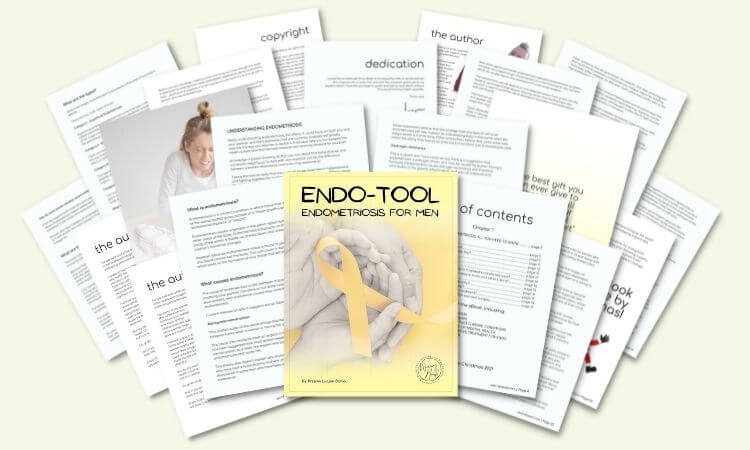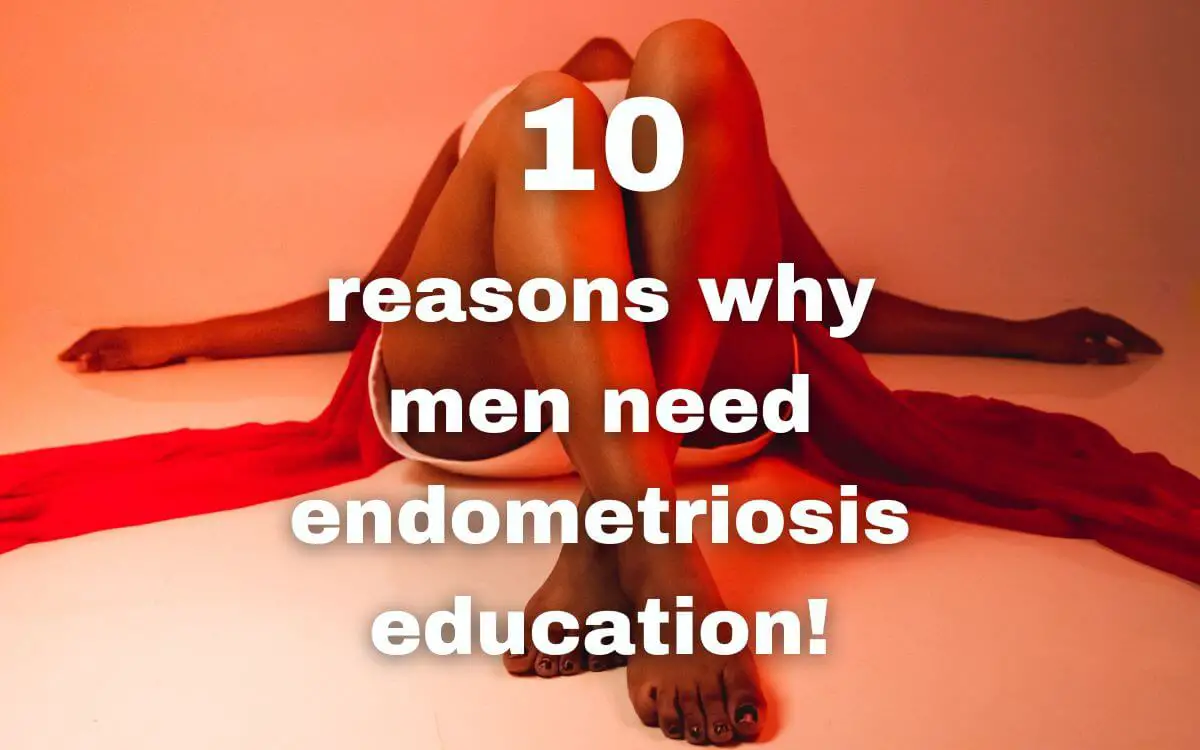The reasons why men need endometriosis education.
Many men don’t understand endometriosis because they don’t experience the symptoms of this insidious condition themselves. Endometriosis can have a significant impact on their partner’s health and quality of life, and this is why men need endometriosis education.
By increasing their understanding of endometriosis, men can play a vital role in supporting their partners during this difficult time.
In order to understand why I’m doing this, you need to learn my story…
- A man on a mission…
- Why men need endometriosis education…
- What is endometriosis?
- What are the types and stages?
- How is endometriosis diagnosed?
- How does it impact her life?
- How can men help?
- 1. Be understanding and patient.
- 2. Listen to your partner and offer emotional support.
- 3. Help with household chores and child care.
- 4. Attend doctor's appointments with your partner.
- 5. Advocate for your partner's needs.
- 6. Educate yourself about endometriosis.
- 7. Be supportive of treatment options.
- 8. Help with financial burdens.
- 9. Keep communication open.
- 10. Seek professional help if needed.
- Final thoughts on why men need endometriosis education!
A man on a mission…
I still remember the day when I learned that my wife has endometriosis. It was a complete shock for me as I never heard of this condition before. I couldn’t spell the word, let alone understand it.
Endometriosis was alien to me, I felt powerless and lost. I wanted to help my wife but didn’t know how. So, I started on a mission to learn everything I could about endometriosis.
This website is the result of that mission.
My goal is to provide men with the information they need to understand endometriosis and support their partners.
I’ll never forget how helpless I felt when I learned my wife had endometriosis. My hope is that by sharing my story and the lessons I’ve learned, I can help other men feel more equipped to support their partners during this difficult time.
But I went beyond my own expectations and aside from creating this very blog, I even wrote three books. So, if you’re a man who wants to learn more about endometriosis, you’re in the right place.
Welcome!
If you want to learn more about endometriosis, I wrote an “Endo-Tool, Endometriosis for Men” e-Book.
You can get the 1st Chapter of the e-Book for FREE, and if you like it, you’ll get a Whopping 33% Discount on the Whole Book, plus discounts on other helpful tools. You have nothing to lose but a lot to gain!
The first chapter alone contains all the comprehensive medical knowledge about endometriosis, including:
- What is endometriosis?
- What are the symptoms?
- What causes endometriosis?
- What does endometriosis look like?
- What are the stages?
- What are the types?
- What is adenomyosis and how is it related to endometriosis?
- Why do some women develop severe endo and others don’t?
- Does endometriosis cause infertility?
- How is endometriosis diagnosed?
- Do types and stages affect the treatment?
- Recurrence of endometriosis after excision surgery.
FREE Chapter of “Endo-Tool”
Endometriosis e-Book for Men

Why men need endometriosis education…
There are many reasons why men need endometriosis education. To name a few:
- Endometriosis can have a major impact on fertility. If you and your partner are trying to conceive, it’s important to be aware of the potential difficulties you may face.
- Endometriosis can be a very painful condition. Men need to understand the level of the pain their partner may be experiencing on a daily basis.
- Endometriosis can have a huge psychological impact. The anxiety and stress of living with this condition can take their toll on even the strongest person. Men need to be aware of the emotional challenges their partner is facing.
So please, take some time to read through the content on this blog because it could make all the difference for your partner.
What is endometriosis?
Endometriosis is an unbearably painful chronic condition that affects women of childbearing age. Despite its high prevalence, endometriosis is still relatively unknown and misunderstood, even by many medical professionals.
This condition occurs when a tissue that is similar to the lining of the uterus starts to grow outside of the uterus. This misplaced tissue can implant itself on the ovaries, fallopian tubes, or anywhere else in the pelvic region.
Since endometriosis is a full-body disease, it isn’t common to find endometrial tissue in other parts of the body. In rare cases, when left untreated, endometriosis has been found in the brain, lungs, and even the eyes.
What are the types and stages?
There are four types and four stages of endometriosis, making this chronic illness very complex.
They are four types of endometriosis:
- Type 1: Superficial peritoneal endometriosis.
- Type 2: Endometriomas.
- Type 3: Deeply infiltrating endometriosis.
- Type 4: Abdominal wall endometriosis.
There are four stages of endometriosis:
- Stage 1: Minimal.
- Stage 2: Mild.
- Stage 3: Moderate.
- Stage 4: Severe.
For a full description of all the above, I would recommend you to check out this article.
How is endometriosis diagnosed?
Endometriosis can be diagnosed through a number of methods, including:
- Pelvic exam: Your doctor may feel for any abnormalities in your pelvic region.
- Ultrasound: This imaging test can be used to look for endometriomas (cysts that form as a result of endometriosis).
- MRI: This imaging test can be used to get a more detailed view of the pelvis.
- Laparoscopy: This is a surgical procedure in which a small camera is inserted through a small incision in the abdomen. This allows your doctor to directly visualize any endometrial tissue that has grown outside of the uterus.
- Biopsy: This is a surgical procedure in which a small sample of tissue is removed and examined for the presence of endometriosis.
The most accurate form of diagnosis of endometriosis is laparoscopy with a biopsy of the tissue.

How does it impact her life?
Endometriosis is a complex condition that can cause a wide range of symptoms, from mild to severe. The way your partner reacts to her symptoms will depend on the endometriosis type and stage.
It will also depend on her environment and lifestyle, however, the most common symptoms include:
- Severe pain during menstruation (dysmenorrhea).
- Pelvic pain and cramping (pelvic inflammatory disease).
- Pain during or after sexual intercourse (dyspareunia).
- Heavy bleeding during menstruation (menorrhagia).
- Chronic fatigue (extreme tiredness).
- Infertility (problems with conceiving).
If you’re a man reading this, it’s likely that you don’t experience the symptoms of endometriosis yourself. However, it’s important to remember that your partner is living with this condition every day. The pain and other symptoms can have a major impact on her quality of life.
How can men help?
There is a lack of understanding that can be especially true for men, who may not be aware of the condition and its effects on their partner’s health.
While endometriosis can cause significant physical and emotional pain for women, it can also have a major impact on their relationships. The condition can lead to difficulties with communication, intimacy, and sexual functioning.
It is important for men to be aware of these potential problems and to understand how they can help their partner cope.
Men can help women with endometriosis in many ways, here’s how:
- Be understanding and patient.
- Listen to your partner and offer emotional support.
- Help with household chores and child care.
- Attend doctor’s appointments with your partner.
- Advocate for your partner’s needs.
- Educate yourself about endometriosis.
- Be supportive of treatment options.
- Help with financial burdens.
- Keep communication open.
- Seek professional help if needed.
1. Be understanding and patient.
Endometriosis can be a very painful and frustrating condition, and your partner may not always be able to cope with the pain.
Even though you will never be able to fully grasp what your partner is going through, try to be understanding of her situation. And don’t forget to be patient, as the road to diagnosis and treatment can be long and difficult.
It takes on average 7 to 8 years to diagnose endometriosis. My wife was lucky to be diagnosed in 5 because we both pushed the doctors, and my presence helped my wife avoid being medically gaslighted.
2. Listen to your partner and offer emotional support.
Endometriosis can be a very emotionally demanding condition, and your partner may need to talk about her feelings and experiences.
I have always done that. I still do.
I listen to my wife without interruptions because I want to know what is going on in her life, and how I can help. If I was to interrupt her with any kind of suggestions, she would feel unheard, and that would make the situation worse.
So, listen, and listen openly and honestly. You can always ask questions after.
3. Help with household chores and child care.
The pain and fatigue of endometriosis can make it difficult for your partner to keep up with her usual activities.
Ideally, you should get out there and do something before she asks you to. It shows that you care and want to help, not because you think she is incapable. This is important because endometriosis can lead to feelings of inadequacy.
I clean my wife’s shower or bathtub, do shopping, hoover the house, or take the rubbish out. I do all that on my own accord because I know it helps her a lot.

4. Attend doctor’s appointments with your partner.
This can help ensure that she receives the best possible care and treatment.
Some doctors think they know best, even though they know very little about endometriosis. They might dismiss your partner’s symptoms or suggest that they’re not real. I’m talking about general practitioners.
Having a second person (especially a man) in the room can help put the doctor’s mind at ease and make them take your partner more seriously.
Not only you confirm what your partner is going through, but you can also ask questions, take notes, and be an advocate for her.
5. Advocate for your partner’s needs.
Talking of advocating, endometriosis is often misunderstood or downplayed by family, friends, and even medical professionals. It is important to be an advocate for your partner and to ensure that her needs are taken seriously.
Not only I stood by my wife’s side during her various doctor’s and hospital appointments, I even organized a meeting with her boss to discuss the difficulties she faced because of her illness. I was met with understanding and compassion.
My wife began to work from home since, which gave her more control over most of her physical and mental symptoms. My advocacy allowed her to cope better in both aspects.
6. Educate yourself about endometriosis.
The more you understand the condition, the better you will be able to support your partner.
There is nothing more important than educating yourself about this condition. Endometriosis can be very unpredictable, and the more you know about it, the better equipped you will be to deal with any situation.
Make sure to read, watch documentaries, or look for podcasts about endometriosis. There is a lot of good information out there, and you can never know too much. This is where men need endometriosis education in forms such as books!
Here’s a reminder of what you can expect from my FREE chapter of the endometriosis eBook:
- What is endometriosis?
- What are the symptoms?
- What causes endometriosis?
- What does endometriosis look like?
- What are the stages?
- What are the types?
- What is adenomyosis and how is it related to endometriosis?
- Why do some women develop severe endo and others don’t?
- Does endometriosis cause infertility?
- How is endometriosis diagnosed?
- Do types and stages affect the treatment?
- Recurrence of endometriosis after excision surgery.
FREE Chapter of “Endo-Tool”
Endometriosis e-Book for Men

7. Be supportive of treatment options.
Endometriosis can be a difficult condition to treat, and there is no one-size-fits-all solution. It is important to be supportive of whatever treatment option your partner chooses.
There is the medical approach, and there is the holistic approach. The mixture of both works best!
Medically speaking, there are various treatments available, including hormone therapy, pain medication, and surgery. Some women find relief with one of these methods, while others have to try a combination of different treatments.
Holistically, there are dietary changes, supplements, acupuncture, and more. Again, some women find relief with one of these methods, while others have to try a combination.
8. Help with financial burdens.
Endometriosis can often lead to significant financial burdens, due to doctor’s appointments, treatments, and missed work days. If possible, help your partner with these costs.
There are various ways that people suggest you should do it, but there is nothing better, cheaper, and risk-free than blogging.
Oh yes, my friend – you heard me right – blogging!
Blogging isn’t a hobby anymore, it has become a full-time profession for many people, and I am on my way to becoming a full-time blogger too.
If you are passionate about something, chances are you can turn that passion into a money-making machine, and endometriosis is a great topic to blog about.
Not only will you be helping your partner financially, but you will also be raising awareness about this important issue.
If you are struggling to earn ends meet and want to help yourselves financially, I run another blog dedicated to this very subject. I can help you start a blogging business, so check this article out!
9. Keep communication open.
Endometriosis can put a strain on even the strongest of relationships. It is important to keep communication open and to discuss any problems or concerns that either of you may have.
Communication is important in any healthy relationship, but it is even more important amongst couples who are dealing with endometriosis.
Endometriosis can be a very isolating condition, and it is easy for sufferers to feel like they are alone in this battle. Talking openly and honestly about the condition can help to foster a sense of understanding and unity between partners.
10. Seek professional help if needed.
Nobody is unbreakable, and even the strongest relationships can be strained by endometriosis. If you find that you are struggling to cope, don’t hesitate to seek professional help.
Being a man, I know that it is tough to talk about how we feel. Society has conditioned us to bottle up our emotions and tough them out. But sometimes, we need to reach out for help.
There is no shame in admitting that you need help to deal with endometriosis. In fact, it takes a lot of strength and courage to reach out for it!
There are counselors and therapists who specialize in helping couples deal with chronic illness, and they can provide invaluable support, so if you feel like you are struggling to cope with your partner’s endometriosis, or if your relationship is suffering, don’t hesitate to seek such support.
Final thoughts on why men need endometriosis education!
There are several reasons why men need endometriosis education. As I previously mentioned, the condition is still relatively unknown and misunderstood. This lack of awareness makes it difficult for men to provide support and understanding to their partners.
Endometriosis can have a major impact on a woman’s sexual health, which can in turn affect her relationship. It can also bring a financial burden, as the costs of treatment and loss of time of work can be significant.
Men need endometriosis education so that they can better understand the condition and its effects on their partner’s health, and in turn, theirs.
With this knowledge, they can provide the support and understanding that their partner needs.
Additionally, men need to be aware of the potential impact of endometriosis on a woman’s sexual health and be prepared to discuss any concerns with them. By being informed about all aspects of the condition, men can be an invaluable source of support for their partners.


About Me
Hi, I’m Lucjan! The reason why I decided to create this blog was my beautiful wife, who experienced a lot of pain in life, but also the lack of information about endometriosis and fibromyalgia for men...
